Conjugated linoleic acid (CLA) supplements have been marketed primarily for weight control and their ability to lower high cholesterol. CLA is a naturally occurring polyunsaturated fatty acid found in the milk and meat of grass-fed animals, namely cows, goats, sheep, and deer.
Early research reveals it may influence the onset and severity of several chronic diseases, including various cancers, atherosclerosis, obesity, bone density loss and diabetes (1, 2).
Best CLA
1. Essential Elements CLA
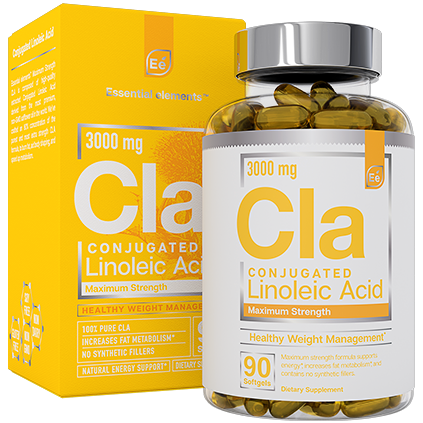
CLA has a myriad of health benefits, especially in terms of weight loss – but since it’s not made in the human body, we often don’t get to experience any of the benefits. This is where Essential elements CLA comes in. Essential elements CLA provides a non-GMO supplement at maximum strength (3000mg per serving) to melt even the most stubborn of body fat – without changing your diet or exercise routine.
Every batch is third party lab tested for purity – a rare treat in this industry. For these reasons, and more, this is Healthtrends #1 CLA supplement of 2020.
2. VitaBalance CLA 2000
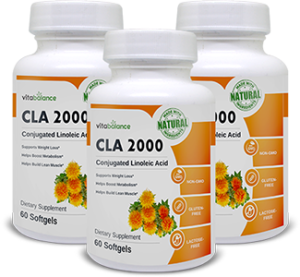
VitaBalance CLA 2000 is formulated with natural ingredients and extracts that have been studied and have shown in some cases to be effective in supporting weight management, supporting lean muscle mass, and helping to maintain healthy energy levels throughout the day.
VitaBalance CLA 2000 is made in the US within an FDA registered facility that follows GMP guidelines.
3. Sports Research Max Potency CLA 1250

SportsResearch CLA capsules each contain 95% CLA, with 1087 mg per capsule. These capsules are sourced from 100% safflower seed oil and are kosher, gluten-free. They are also free of any fish, shellfish, soy, peanuts, gluten, dairy, egg, wheat, yeast, fillers, binders, preservatives, artificial ingredients, or magnesium stearate.
This CLA supplement has not only been Igen tested to ensure non-GMO compliance, but also tested by a 3rd party to ensure outstanding quality. The company is GMP (Good Manufacturing Practice) certified.
4. NatureWise Elite CLA 1300

NatureWise Elite CLA 1300 was designed with a maximum potency formula that is at least 95% pure and active CLA. Each soft gel contains 1300 mg in a Halal certified capsule. It’s also non-GMO, and free of soy, gluten, nuts, dairy, eggs, fish and shellfish.
NatureWise believes in transparency, so you can use the Transparency mobile app to scan your CLA jar and see exactly how it was made. It includes all details, from ingredient information to the manufacturing details. It even shows the independent lab test results that will verify its purity and potency.
5. GNC Total Lean CLA

Check price at Amazon
GNC Total Lean CLA supplement contains 2,000 mg of CLA per serving and is sourced from safflower oil, ensuring that it’s free of any sugar, gluten, starch, artificial colors or flavors, sodium, corn, soy, wheat and dairy.
GNC created the Total Lean CLA supplement based on a scientific formula that was shown in studies to improve body competition, increase lean muscle tone, and fuel energy.
6. Vitamorph Labs CLA 3000

Check price at Amazon
Vitamorph Labs CLA contains 3,000 mg of CLA per serving. Their supplements come with a 100% satisfaction guarantee and amazing customer service because
This supplement was created with the best ingredients available and manufactured in the USA in a certified, cGMP registered facility. Vitamorph Labs CLA is non-GMO and use vegetable glycerine in their capsules, making them even safe for vegans.
7. Purity Labs CLA 4,500
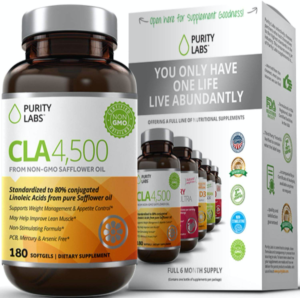
Purity Labs offers 100% pure, non-stimulating, non-GMO CLA supplements, derived from 100% pure safflower oil. Purity Labs ensures that all of their supplements go through extensive third-party testing before being bottled or sold, and only manufactures their products in GMP certified facilities based in the USA.
They use the most potent and premium ingredients and tract their sources back to ensure that they’re using plants that are free of any added antibiotics or chemicals. This means all Purity Labs products are free of fillers, trans fats, preservatives, soy, sugar, dairy, artificial flavors or coloring, and wheat.
8. Bronson CLA 3000
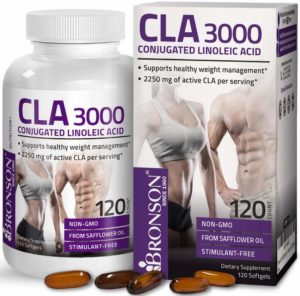
Bronson’s CLA formula is very high potency, with 2250 mg of active CLA per serving. The company has been around since the 60s when they were founded by a group of pharmacists who studied the benefits and effects on their patients.
They source their CLA from safflower oil, and all their supplements are non-GMO. Brinson manufactures their supplements in FDA and cGMP certified facilities.
9. Orphic Nutrition All Natural CLA 2000
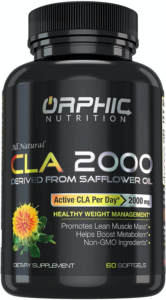
Orphic Nutrition CLA capsules are organic, using pure safflower oil. They are 100% raw and natural, which means they are non-GMO, organic, gluten-free capsules that contain no preservatives, additives, pesticides, allergens, or artificial chemicals.
Their products are manufactured in the USA in a GMP-certified facility. Additionally, they are third-party verified.
10. Sheer Strength Extra Strength CLA for Women
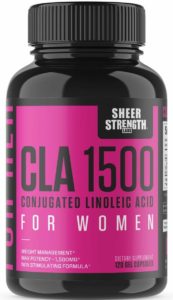
Sheer Strength supplements are manufactured and formulated specifically for the needs of women. Each capsule of Sheer Strength Extra Strength CLA contains 1,500 mg of CLA derived from safflower oil. They are non-GMO and free of any artificial colors, flavors, or sweeteners.
They also contain no preservatives, no sugar, no starch, no milk or lactose, no soy, no wheat, no yeast, and no fish.
11. Horbaach CLA 3000
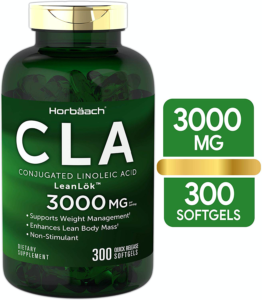
Horbaach CLA contains 3,000 mg per capsule. It’s sourced from safflower oil, and each capsule uses vegetable glycerine so this product is safe for vegans. This supplement is free of any gluten, dairy, artificial sweeteners, flavors, preservatives, milk, lactose, yeast, soy, wheat.
All Horbaach manufactured in the USA in GMP certified facilities that are registered with the FDA.
How We Rank
The first thing we considered, when formulating our rankings for the best CLA, was to ensure that all of the products undergo third-party testing. A lot of companies can make claims about their quality standards, purity, and ingredients. We rewarded companies like Purity Labs and Orphic Nutrition because they provided third-party testing results to ensure the quality and purity of ingredients.
Next, we looked at the ingredients. All of our recommended supplements derive their CLA from safflower oil. This means that the purity of the ingredients can be traced all the way back through to the sourced agricultural field. We rewarded companies like NatureWise Elite CLA that contained 95% active CLA, the highest available standard in the market.
Third, we looked at the other ingredients involved. We wanted to ensure purity and compliance with as many lifestyles (vegan, vegetarian etc.) as possible. Several of these products are vegan, and all of them are vegetarian-friendly. Every single one of the products on this list is non-GMO and gluten-free, to ensure purity. None of them, like VitaBalance CLA 2000 contain artificial ingredients, dairy, lactose, soy, eggs, and wheat. All products on our list also have no preservatives, no sugar, no starch, and no additives.
Finally, we looked at manufacturing. We preferred products, like Vitamorph Labs CLA 3000, that were manufactured in the USA because the requirements and standards for manufacturing are much more rigorous here than in a lot of other countries. Because of this, we know that manufacturing facilities that have earned cGMP certifications and approval to be registered as up to the FDA standards are facilities that can be trusted with quality control throughout the manufacturing process.
Benefits
1. CLA has fat-burning potential. As the number of obese individuals increases worldwide, researchers have been focusing their attention on various supplements and their role as potential weight loss treatments.
CLA is one such supplement and has been investigated as a fat burner due to its effect on a molecular signaling receptor family named PPAR which is related to fat burning, steroid signaling, inflammation and glucose/lipid metabolism.
In animal studies, supplementation has generally been found to effective in reducing food intake, increasing fat burning, stimulating fat breakdown and inhibiting fat production.
Some human clinical studies suggest an association with supplementation of 3.4 to 6.8 grams a day of CLA for 12 weeks in reducing body fat mass in overweight and obese volunteers. Many of the effects, however, are small.
In one study consisting of 60 overweight or obese male and female volunteers who received 3.4 grams a day of CLA for 12 weeks, showed a small reduction in mean body mass index (BMI) and mean weight (2.4 pounds) 3.
Other human studies showed no change in weight at all.
According to the American Journal of Clinical Nutrition, a daily dose of 3.4 grams of CLA taken for one year did not prevent weight or fat mass regain in the group of 122 obese participants (4).
Similarly, in sedentary young women, a daily intake of 2.1 grams of CLA for 45 days did not induce any changes in body composition. Likewise, daily consumption of 4.5 grams CLA isomeric mixture showed no decrease in body weight, in comparison to the consumption of safflower oil as a placebo in 85 overweight and obese male subjects (5).
2. CLA may lower cholesterol. Based on the results of a study published in The Journal of Nutrition, researchers found that supplementation of an isomeric blend of CLA for 12 weeks (1.7 to 6.8 grams a day) decreased total cholesterol and LDL (or bad) cholesterol.
In addition, CLA (in a dose of 3 grams a day) for 8 weeks increased total HDL (or good) cholesterol concentrations by 8 percent. HDL is often referred to as “good” cholesterol due to its ability to carry some LDL (bad) cholesterol away from the arteries and back to the liver, where the LDL is broken down and passed from the body.
Furthermore, the ratio of LDL cholesterol to HDL cholesterol was significantly reduced in subjects with stable, diet-controlled type 2 diabetes (6).
Some studies, however, found little to no benefit of supplementation on lowering cholesterol levels. A 93-day study of 17 healthy female volunteers showed that daily supplementation of 3.9 grams a day of CLA did not alter cholesterol levels (7).
3. CLA may help improve cardiovascular health. Several studies reveal that combination treatment with CLA and nitrite preserve cardiovascular function in mice. Building on these results, researchers evaluated the effects of both in providing cardiac protection during a heart attack.
To test this hypothesis, 12-week old mice were treated with CLA or CLA and nitrite 3 days prior to replicating a heart attack. The results suggested that treatment with CLA and nitrite may provide significant protection during a heart attack (8).
Increased dietary sugars for healthy individuals or poor glycemic control in diabetic patients further increase cardiovascular disease risk. Diabetes is associated with the development of a distinct condition of the heart muscle known as diabetic cardiomyopathy.
A 2016 study in rat cells found that cells pre-treated with CLA and then exposed to high glucose levels had reduced heart damage and a decreased risk of heart disease than cells not pre-treated (9).
4. CLA may help treat fatty liver disease. Non-alcoholic fatty liver disease (NAFLD) is a condition in which excess fat is stored in the liver; left untreated, it can lead to late-stage scarring (fibrosis) in the liver.
Researchers of a 2016 trial investigating the effects of CLA on glycemic response, lipid profile and oxidative stress in obese patients with NAFLD, were met with promising results.
At the end of the randomized, controlled clinical trial, they concluded that supplementation improved insulin resistance, lipid disturbances, oxidative stress and liver function in NAFLD, and could be considered as an effective complementary treatment for this common condition (10).
5. CLA may help treat rectal cancer. In a 2013 study of rectal cancer patients undergoing chemoradiotherapy (chemotherapy and radiotherapy treatment together), CLA supplementation improved inflammatory factors, MMP-2, and MMP-9 (biomarkers of tumor invasion).
Researchers are hopeful that CLA may provide new complementary treatment by reducing tumors and resistance to cancer treatment in patients with rectal cancer (11).
The results of a study published in The American Journal of Clinical Nutrition found that women who consumed four or more servings of high-fat dairy foods per day (including whole milk, full-fat cultured milk, cheese, cream, sour cream, and butter) showed half the risk of developing colorectal cancer, compared to women who consumed less than one serving per day (12).
Researchers believe this can be attributed to the CLA content that is naturally found in the milk of grass-fed animals.
Regularly consuming full-fat milk and dairy products, however, can increase the risk of heart disease.
6. CLA may treat breast cancer. According to a study published in Breast Cancer Research and Treatment, researchers noted reduced breast cancer tissue production in women with lipogenic phenotype breast cancer, after being treated daily with 7.5 grams of CLA for 12 days (13).
Another study found that administering CLA in conjunction with Gemcitabine —a chemotherapy drug that works by slowing or stopping the growth of cancer cells — was effective in treating the growth of tumors (14).
7. CLA may treat bladder cancer. In human bladder cancer cells, trans-10,cis-12 isomers effectively decreased the spread of cells and increased cancer cell death (15).
Further research along with clinical trials are needed to learn more about the role CLA plays in the prevention and treatment of cancer. Currently, little information is available on the mechanisms by which CLA prevents or inhibits cancer.
8. CLA has anti-inflammatory effects. Fatty acids (such as CLA) are important modulators of inflammatory responses, and CLA has received particular attention recently for its ability to modulate inflammation. The findings of a 2018 in vitro study, suggest that CLA inhibits the expression of cytokines — cell signaling molecules that regulate various inflammatory responses (16).
9. CLA may help maintain a healthy immune system. In their search for nutritionally-based therapeutic approaches to boost the immune system’s resistance against infectious diseases, scientists have turned their attention to CLA.
Recent publications demonstrate that cis-9,trans-11 CLA and trans-10,cis-12 CLA isomers exert distinct effects on immune function, such as decreasing interleukin 6 (IL-6) production and tumor necrosis factor-alpha (TNF-alpha) — a cell-signaling protein (cytokine) that plays an important regulatory role in various immune responses and inflammatory conditions (17).
Most studies have focused on animals — particularly mice and rat models. Future studies are needed to gain a clearer understanding of the immunomodulatory properties of CLA in humans.
10. CLA may improve bone health. Data from a 2013 study demonstrated that CLA, along with dietary calcium, holds promise in helping prevent bone loss associated with menopause. In addition, CLA supplementation significantly prevents postmenopausal-associated weight and fat mass gain, compared to non-supplemented controls (18).
In an animal study evaluating the effectiveness of combining CLA supplementation with exercise in improving bone health, researchers found that CLA effectively increases bone mass on its own, and is not further improved by exercise (19).
The effects of supplementation in men, however, are not as promising. A human study testing the effects of CLA supplementation in adult men concluded that supplementation did not affect markers of bone metabolism (20).
The mechanism by which CLA exerts its effect on bone is still not very clear, and further investigation of the effects of CLA on calcium and bone metabolism is warranted.
11. CLA may be beneficial to humans prone to diabetes. Being overweight or obese increases the chances of developing type 2 diabetes. Researchers remain hopeful that if CLA can improve glucose homeostasis and inhibit body fat (as demonstrated in several animal studies), then supplementation may be beneficial to individuals susceptible to type 2 diabetes.
The results of one study showed that feeding CLA to rats prone to developing diabetes normalized glucose tolerance and improved excess levels of insulin (21).
In a study of abdominally obese male participants, researchers noted a decline in insulin sensitivity after supplementation with both mixed and purified 9- and 10–CLA isomers at a daily dose of 3.4 grams for 12 weeks.
Not all studies, however, found CLA to have anti-diabetic properties in humans. Daily supplementation of 3 grams of CLA (in 24 women) for 64 days showed no significant changes in the levels of circulatory glucose or insulin. CLA isomeric blends at the same dose also showed no significant effects on plasma glucose or insulin levels in healthy human participants (22).
12. CLA may enhance physical performance. According to the results of a recent study published in the journal, PLOS One, CLA supplementation effectively enhanced testosterone production. As a result, researchers concluded that supplementation of CLA, along with physical activity may be able to enhance the effects of training on muscle mass and performance as well as prevent muscle wasting (23).
In another study, daily administration of 6 grams of CLA (in combination with 5 grams of creatine monohydrate) followed by resistance exercise training in older adults (above 65 years old) for 6 months enhanced strength gains and improved body composition (24).
A study published in the International Journal of Sport Nutrition and Exercise Metabolism, also found that supplementation with CLA (6 grams a day) along with creatine (9 grams a day) and whey protein (36 grams a day) was beneficial for improving body strength and lean body mass during heavy resistance training in well-trained young adults (25).
The results of another study, however, demonstrated that while supplementation may improve the performance of endurance athletes by increasing muscle mass, at the same time, it may cause oxidative stress damage (26).
Side Effects
According to several studies, doses ranging from 3 to 6 grams a day, appear to be safe when used short term. CLA is classified by the U.S. Food and Drug Administration as GRAS (“generally regarded as safe”).
There is not enough evidence to know if long-term use is safe. Large doses of supplemental CLA have been linked to adverse effects. Authors of a 2016 comprehensive review on the pros and cons of CLA stress that a definite conclusion for the safety of supplementation has not yet been made.
1. CLA can cause gastrointestinal symptoms. Supplementation has been linked to upset stomach, with symptoms of gas, bloating, nausea and diarrhea.
Fatigue is another mild side effect.
2. CLA may increase inflammation. While some studies show CLA’s anti-inflammatory effects, numerous other studies in both animals and humans reveal that CLA can actually increase inflammation.
3. CLA may cause insulin resistance. CLA should be used with caution in patients who have diabetes or metabolic syndrome as it may worsen insulin resistance. Insulin resistance is a condition in which cells do not respond properly to insulin (even if it is available in the blood), which leads to high blood insulin.
4. Large doses of CLA can increase the accumulation of fat in the liver. In one study, mice fed a diet enriched in trans-10,cis-12 for 4 weeks developed fatty liver (27).
5. CLA may interact with medications that slow blood clotting. The cis-9,trans-11 isomer has been shown to have anticoagulant/antiplatelet activities. Taking it along with medications that also slow clotting — warfarin (Coumadin), ibuprofen (Advil, Motrin, and others) — might increase the chances of bruising and bleeding.
Recommended Dosage
There are no established recommended dosages, but the majority of the studies performed have used a range of 3 to 6 grams a day without harmful side effects.
One review concluded that a minimum of 3 grams daily is necessary for weight loss.
Due to the possibility of adverse reactions, speaking to a medical professional before taking CLA supplements is advised.
FAQ
What is conjugated linoleic acid? It is a fatty acid naturally found in the milk and meat of grass-fed animals and is believed to offer various health benefits, namely, the ability to burn fat. The word “conjugated” has to do with the arrangement of the double bonds in the fatty acid molecule.
What is another name for conjugated linoleic acid? This fatty acid is sometimes referred to as CLA or is identified by its isomers — cis-9,trans-11 conjugated linoleic acid and trans-10,cis-12 conjugated linoleic acid.
When is the best time to take conjugated linoleic acid? Manufacturers of CLA supplements generally recommend taking supplements with meals.
How much conjugated linoleic acid should be taken for weight loss? Although further research is needed to determine an efficacious dose, research generally finds that a minimum of 3 grams daily is necessary for weight loss (28).
Does CLA suppress appetite? While CLA reduces appetite and intake in animal studies, it has not been shown to effectively reduce appetite in humans. A 12-week study in 62 people found that 3.9 grams of CLA per day had no effect on appetite or body composition (29).
What are the benefits of conjugated linoleic acid? CLA is primarily touted for its fat-burning and weight loss benefits. Early research also points to its ability to lower cholesterol and to treat certain cancers, atherosclerosis, type 2 diabetes, and bone density loss. However, the results of studies have been inconsistent and further research is needed to learn about its health benefits.
Where does conjugated linoleic acid come from? It is a type of polyunsaturated fatty acid that is found naturally in foods like beef and dairy. CLA supplements are primarily made by chemically altering the linoleic acid found in vegetable oils, namely, safflower oil.
What are the side effects of conjugated linoleic acid? Doses ranging from 3 to 6 grams a day, appear to be safe when used short term. Supplements of CLA have been linked to adverse effects such as gastrointestinal upset (gas, bloating, nausea and diarrhea). Large doses may increase inflammation, cause insulin resistance and lead to the accumulation of fat in the liver.
What foods contain conjugated linoleic acid? It is found in the beef and milk of grass-fed animals, especially cows, goats, and sheep.
Where can someone buy conjugated linoleic acid? CLA supplements can be found at many vitamin and supplement retailers, health stores and pharmacies.
What type of fat is conjugated linoleic acid? It is a polyunsaturated, omega-6 fatty acid. CLA is technically a trans fat, which, in most cases, is an unhealthy fat that is linked to a higher risk of heart disease. However, CLA is a natural form of trans fat and does not seem to have the same negative health effects as artificially produced, industrial trans fats, such as those found in processed foods.
What is the safe daily dose of conjugated linoleic acid? While studies show doses of 3 grams to 6 grams to be safe, more research and clinical trials are needed to determine the safest daily dose, especially when used long term.
How can conjugated linoleic acid benefit athletes? CLA may improve the performance of endurance athletes by increasing muscle mass. Studies are mixed, however, and further studies are needed.
How can someone get conjugated linoleic acid naturally? People can get CLA naturally by consuming foods such as grass-fed beef, butter, and full-fat dairy. The amount of CLA in animal products depends on farming techniques. Products from grass-fed animals contain more CLA than those from grain-fed animals. According to researchers, however, to obtain beneficial amounts of CLA, an individual must ingest 10-200 times what can be achieved in diet (30).
Consuming a diet that is high in butter and full-fat dairy can also bring health risks because of the high levels of saturated fat they contain.
What is the difference between conjugated linoleic acid and linoleic acid? Linoleic acid is a polyunsaturated, omega-6 fatty acid found mostly in vegetable oils such as sunflower, safflower, soybean, corn and canola oils as well as nuts and seeds. It is one of the two essential fatty acids required by the body. Omega-6 fatty acids are an important part of a healthy diet. They’re particularly beneficial for the immune system and metabolism. CLA is a type or isoform of linoleic acid, found in the meat and dairy products of grass-fed animals. The word “conjugated” has to do with the arrangement of the double bonds in the fatty acid molecule. CLA is used as a dietary supplement, primarily for fat reduction and weight loss.
How long does it take for conjugated linoleic acid to work? Studies demonstrating CLA’s ability to burn fat and promote weight loss range from weeks to months. It is important to note that individual results may vary.
How is CLA produced in grass-fed animals? Certain grass-fed animals have a unique enzyme in their digestive systems that convert the linoleic acid found in green plants to conjugated linoleic acid. The fatty acid is then stored in the animals’ muscle tissues and milk.
Is there a difference between CLA from grass-fed animals versus conventional fed? Yes, on average, CLA content is 300% higher in grass-fed animals compared to grain-fed.
How did they discover that CLA helps with weight loss? In 1987, researchers were examining the effects of CLA on cancer. It was found to help patients reduce body weight accidentally. Subsequent human studies show that CLA may have anti-obesity properties, further confirming this accidental discovery.
What are the side effects of CLA? CLA can cause diarrhea in certain persons as well as slow blood clotting. It can also lower HDL cholesterol and increase overall systemic inflammation. CLA side effects tend to increase with higher dosages.
Can CLA affect the liver? Yes, large doses of CLA can cause excess fat storage in the liver, which can cause a whole host of other problems in the patient.
How many forms of CLA are there? There are approximately 28 different forms of CLA (known as isomers) of which two — cis-9,trans-11 and trans-10,cis-12 — have been proven so far to have biological activities Each isomer provides different benefits. For example, trans-10, cis-12 isomer is most actively involved in fat burning. Although studies have shown some benefits of CLA supplementation, overall, the clinical evidence is lacking and, at times, inconsistent. For every study that confirms its benefits, there’s another study claiming the opposite.
Recap
CLA is a polyunsaturated fatty acid found in the meat and milk products of grass-fed cows, goats, sheep and deer. It is touted primarily as a fat-burning and weight loss supplement.
Although animal and in vitro research also suggests it may help prevent and treat various cancers, atherosclerosis, obesity, bone density loss and diabetes, the results of early human studies are mixed. For every study that confirms its benefits, there’s another study claiming the opposite.
While doses ranging from 3 to 6 grams a day, appear to be safe when used short term, large doses of supplemental CLA have been linked to adverse effects. Side effects range from gastrointestinal discomfort to increased inflammation, worsening of insulin resistance and the accumulation of fat in the liver.
Individuals should consult with their doctor or medical professional before adding CLA to their routine.
For Healthtrends #1 CLA recommendation, click here.
